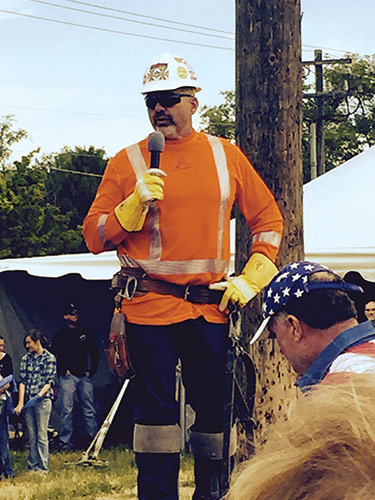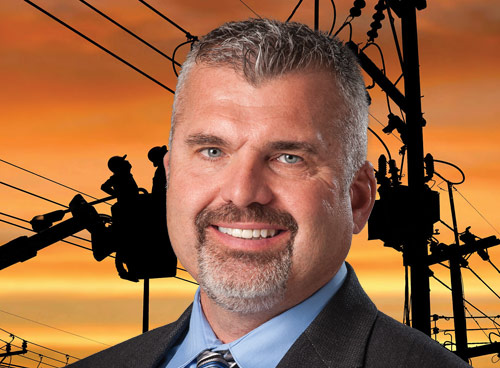IBEW VP, Eighth District
Jerry Bellah is IBEW VP for the Eighth District (Colorado, Idaho, Montana, Utah, Wyoming).

If you were wondering why the lineman braves the elements, and sometimes drives the truck across states to join the fight, read on. It'll be easy to see then that they are truly the passion of power.
PUF's Steve Mitnick: What is your role, and what is your typical day like?
Jerry Bellah: With the virus, I'm on the phone most of the day. As the Vice President of the Eighth District of the IBEW, I'm assigned the five mountain states, which are Wyoming, Colorado, Utah, Montana, and Idaho.
The IBEW local unions in those five states represent linemen, utilities, construction linemen, and inside wiremen as well as many other classifications. In Montana we even represent the lottery workers. We're diverse just like all the districts in the IBEW. It's not just electricians and linemen, rather, it's a little bit of everything.
My job is to assist, along with my staff, those thirty-one locals in those five states. I have a staff of six and a handful of other international representatives that are assigned to this district. We all work to support those locals, whether it's bylaws changes, changes in labor law, organizing, assisting in negotiations, or safety.
It's almost like we're assisting franchises if it was a business. Each of those locals are autonomous but are part of the international union. We're all working together to help our members who are out on the job to improve their working conditions and standard of living.
PUF: What are the linemen in the field like?
Jerry Bellah: Right now, being a lineman in the field, you're one of the more valuable people in the economy in the U.S., as they are considered an essential occupation and stayed working during the lockdown. You're a first responder. It's always nice as a lineman to know the importance of your trade. I worked for years in the field also, so I'm familiar with what they're going through.
The pride of being a lineman is tripled when you get that call in the middle of the night and go out and turn somebody's lights on, they're thankful. You feel good about the job you're doing.
I've been on storm jobs where it's day eight and you turn somebody's lights on and they are so happy and appreciative it's like you saved their first born, but every once in a while they're pissed that you weren't there on day one. I've seen that, too. It's just another part of the job that you have to deal with.
With a big ice storm or tornado or any large disaster, the logistics of it makes it impossible to get to everybody on that first day. There's a lot of pride in our members who are working at utilities and contractors, whether they are directly on the front line or supporting those who do. He or she is working all hours of the night in sometimes extreme conditions helping the community that many times is not the community they are from.
If there's a storm to travel to, they're fighting to be one of those workers that get to go on those front lines in a storm. There's a lot of adrenaline and pride in it.
PUF: Safety is so important and there can be a lot of danger. What are your safety precautions?
Jerry Bellah: Safety has improved and continues to improve. Being a Vice President of the IBEW, we're very conscious of that. We've got folks that are business managers, executive board members, and committee members at a local union who work every day out in the field very hard to improve safety on the job.
They are safety conscious. They want to partner with the employer or the utility as a union officer to improve safety because it directly affects them and their families. There's a lot of great work that goes on between the companies and the lineman, and the linemen who are officers at unions too. They work hard to keep their equipment safe. They go through hundreds of hours of safety training too.
For most apprenticeships, they're not allowed to even go into the high voltage area until they have been in training for two years.
When I was four or five years old, my dad was working on a line in Chicago as a lineman. He was working on a local line there and his pole buddy got killed next to him.
He was on one pole. His buddy was on the other pole. They were taking a cross structure off, and the crane holding it tipped over. It was set up on a hill. It tipped over and took the structure next to my dad with his buddy on it. They were on ninety-foot poles.
My dad went through that and didn't talk a lot about it. When I first got in the trade is when I heard what happened, because he never said anything about it. But some of the guys that were training me knew my dad and were emphasizing how important safety was. They used that as an example and said, your dad was right there when a guy died. Don't ever take the safety side for granted.
It's gotten so much better over the last fifty years with safety and the way companies look at safety. Probably fifty years ago production was the number one thing a company wanted. Now the number one thing a company wants is safety.
PUF: How does that factor into working with the company's management?
Jerry Bellah: At many of the companies they'll have labor management meetings where they discuss it. Many of these meetings are scheduled regularly. Some of them will have safety committees where they have the company and union involved. When it is a coordinated effort, we always have better results.
As we speak, local 111 in Denver is reviewing a safety manual in coordination with a utility.
That safety manual is something that the company is getting ready to implement, but they work with the local before they put out the finished manuals.
It does no good if the employee wants to be safe and the company doesn't, or vice versa. You've got to have both sides wanting to be safe. IBEW has a program called the Utility Code of Excellence.
That's one of the big stresses in the Utility Code of Excellence - the safety aspect on the line side. That's one of those things where it's do your job the right way and safely, both on the management side as well as an IBEW member working in the field.
Safety's a huge part of that. I've been in situations where one side or the other isn't buying in. Sometimes it's the way it's implemented, and you might think it's punitive. Then as Union leadership you've got to get with management and work through the obstacles and present it the right way.
If you come out and show you want to train and you want everybody in the company to be safe, you have a better chance that everybody buys in. I've never met anybody that wants to go to work and get hurt. Also, in our industry you could end up dead if you cut corners on safety.
PUF: With the pandemic, are workers getting sick and having to be replaced?
Jerry Bellah: Not many in my District are getting sick but many utilities have done some shift changes and other things to try to prevent the spread of the virus. When this first happened and the shutdown started, the big thing was we need to protect the first responder. That wasn't just linemen - it was the gas workers and others. The gas workers and linemen had more interaction with customers than others did.
That was the fear more than the actual interaction with each other, even though that was a risk also. They had to go up to the door when there was an outage and this coronavirus was such a big unknown. We had local unions and companies trying to do everything they could to buy masks.
A lot of the locals around the country have now stocked up on masks. The companies have provided masks as well. That was a big issue because we couldn't stop coming to work. We had to keep the lights on. Everybody in the country was trying to buy protective gear.
There was some fear of, are we safe going out there? But our people kept going. We said, we're going to be the industry that Americans are proud of when this pandemic is over. We're going to keep the lights on. We're going to keep our nose to the grindstone, and we're going to do everything as safely as we possibly can.
PUF: What part of your career has been most rewarding for you?
Jerry Bellah: The day I became a journeyman lineman, that was huge. You work hard. You hope you're going to make it and then that day is here. The two biggest days of my life outside of family were becoming an Army vet and getting my journeyman card. If I had to trade one, I would keep my journeyman card.
It's such a great feeling. It's all the work that goes into it and all the people that get you there. It's the trainers and the journeymen.
As an apprentice, every once in a while, you would run into some journeymen that just want to get the job done and would rather not have apprentices. You're slowing them down. They would rather have all journeymen. But most of the time the journeymen take pride in teaching you something new. No matter what style a journeyman had you always learned something from them.
When you get that journeyman card you just tip your hat to all of those people got you to this point. Some of them were hardnosed just get the job done types, and some loved training people. You'd run into many linemen where you can tell they loved having apprentices working on their crews.
Then you become a journeyman and you hope you're one of those guys that enjoys teaching. You're either teaching or you're learning as a lineman your entire career. When you stop teaching and you stop learning, it's time to retire because you might be getting too cocky which could make you unsafe.
Saluting the IBEW and Utility Workforce conversations:
- Jerry Bellah, VP for the IBEW Eighth District (Colorado, Idaho, Montana, Utah, Wyoming)
- Donnie Colston, IBEW Utility Director and Mark Brueggenjohann, Media Director
- Drew Stover, Business Manager for IBEW Local 84 (Atlanta)
- Virgil Melton, Curriculum Specialist at the Electrical Training Alliance
- Kris Anderson, Representative for the IBEW Third District (Delaware, New Jersey, New York, Pennsylvania)
- Rich Meisinger, Business Manager for IBEW Local 111 (Denver)
Category (Actual):
Department:
